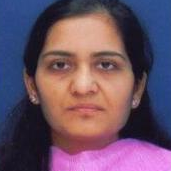
Nidhi Arora
Work place: ITM Universe, Vadodara, Gujarat, India
E-mail: aroranidhig@rediffmail.com
Website:
Research Interests: Artificial Intelligence, Neural Networks, Computer Architecture and Organization, Computer Networks, Data Mining, Data Structures and Algorithms, Logic Calculi
Biography
Dr. Nidhi Arora is Ph.D. in Computer Science, M.C.A. and B.Sc. (Mathematics) gold medalist. She has also cleared National Eligibility Test conducted by UGC in the area of Computer Science. She has more than 14 years of experience in academics, administration and industry. She was awarded the researcher of the year for her contribution in Handwritten Character Recognition by Solutsoft Technologies Pvt. Ltd., Ahmedabad. Her areas of substantial interest include Neural Networks, Fuzzy Logic, Artificial Intelligence, Simulation and Soft Computing Methodologies, data Warehousing and Data Mining. She has guided students of various fields like M.C.A., M.Sc.(IT), B.E.(Computers) and M.E.(Computers) in their industry projects. She is an active contributor to the research world having publications at International and National level majoring in journals like IEEE and Springer.
Dr. Arora is associated as member of Editorial Board with various International Journals from India and abroad. She contributes to the society being a TPC member in International Conferences at countries like India, China, Singapore, Malaysia, Indonesia etc.
Author Articles
Estimation and Approximation Using Neuro-Fuzzy Systems
By Nidhi Arora Jatinderkumar R. Saini
DOI: https://doi.org/10.5815/ijisa.2016.06.02, Pub. Date: 8 Jun. 2016
Estimation and Approximation plays an important role in planning for future. People especially the business leaders, who understand the significance of estimation, practice it very often. The act of estimation or approximation involves analyzing historical data pertaining to domain, current trends and expectations of people connected to it. Exercising estimation is not only complicated due to technological change in the world around, but also due to complexity of the problems. Traditional numerical based techniques for solution of ill-defined non-linear real world problems are not sufficient. Hence, there is a need of some robust methodologies which can deal with dynamic environment, imprecise facts and uncertainty in the available data to achieve practical applicability at low cost. Soft computing seeks to solve class of problems not suited for traditional algorithmic approaches.
To address the common problems in business of inexactness, some models are put forward for servicing, support and monitoring by approximating and estimating important outcomes. This work illustrates some very general yet widespread problems which are of interest to common people. The suggested approaches can overcome the fuzziness in traditional methods by predicting some future events and getting better control on business. This includes study of various neuro-fuzzy architectures and their possible applications in various areas, where decision-making using classical methods fail.
Other Articles
Subscribe to receive issue release notifications and newsletters from MECS Press journals